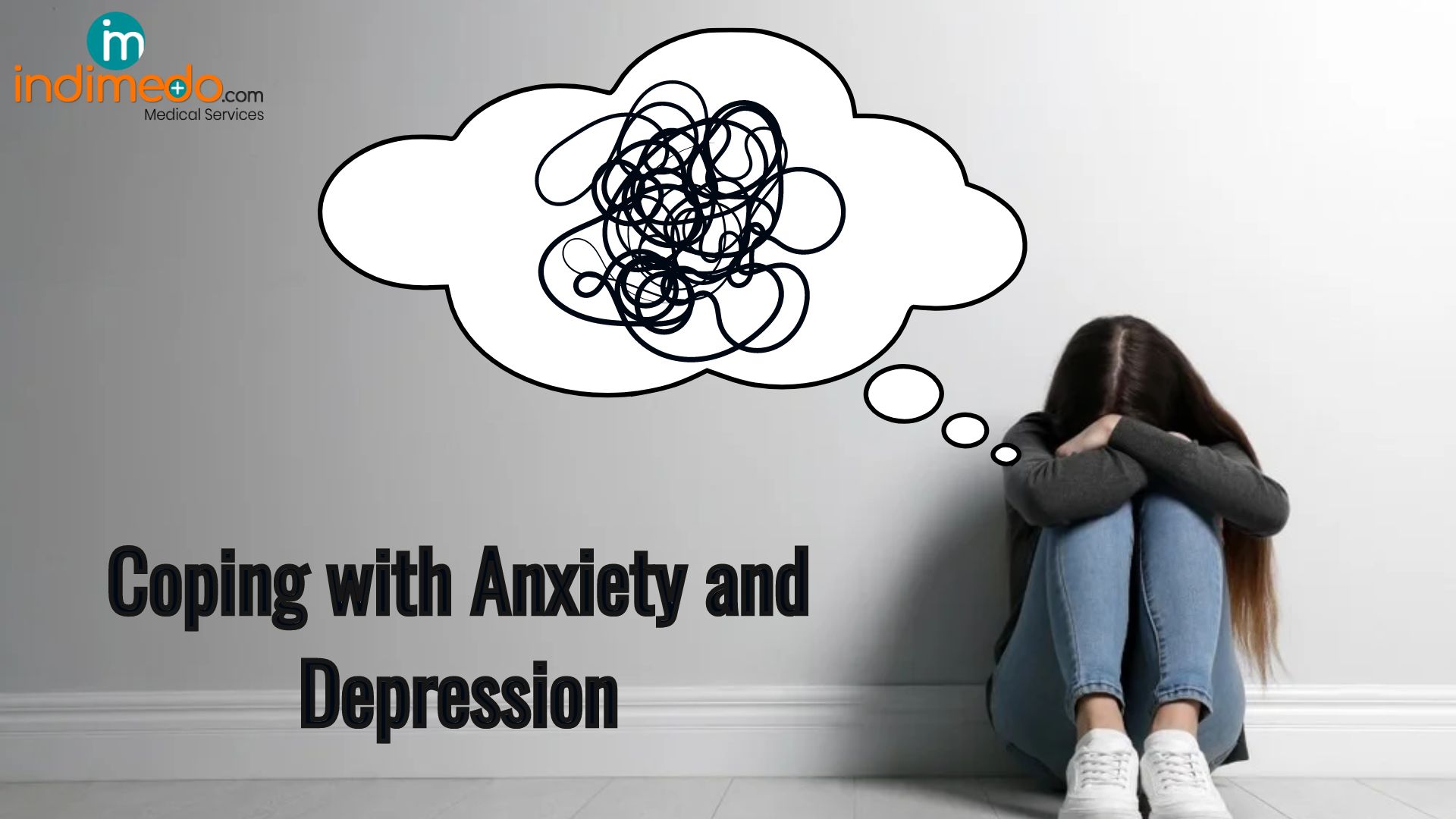Coping with Anxiety and Depression

Anxiety and depression are serious mental health conditions that can have a significant impact on a person's quality of life. Coping with these conditions can be challenging, but there are several strategies and techniques that can help manage symptoms and improve overall mental wellbeing.
Seek professional help:
When it comes to seeking professional help for anxiety and depression, there are several options available:
-
Talk to your primary care doctor: Your primary care doctor can refer you to a mental health professional, such as a therapist or psychiatrist.
-
Seek a therapist: A therapist is a mental health professional who can provide talk therapy, which involves discussing your thoughts and feelings with a trained professional.
-
Find a psychiatrist: A psychiatrist is a medical doctor who specializes in mental health and can prescribe medication to manage symptoms of anxiety and depression.
-
Consider group therapy: Group therapy involves participating in therapy sessions with others who have similar mental health concerns. It can provide a supportive environment and help reduce feelings of isolation.
-
Utilize online resources: There are several online resources available, such as virtual therapy sessions and self-guided therapy programs, that can be accessed from the comfort of your own home.
Remember that seeking professional help is a brave step in managing anxiety and depression. Mental health professionals are trained to provide support and guidance, and there is no shame in asking for help when you need it.
Practice self-care:
Self-care is essential for managing symptoms of anxiety and depression. Here are some self-care practices that can be helpful:
-
Exercise regularly: Exercise has been shown to be an effective way to manage symptoms of anxiety and depression. Aim for at least 30 minutes of physical activity each day.
-
Practice mindfulness: Mindfulness involves focusing on the present moment and can help reduce feelings of stress and anxiety. Try activities such as meditation or deep breathing exercises.
-
Get enough sleep: Lack of sleep can exacerbate symptoms of anxiety and depression. Aim for 7-8 hours of sleep each night and establish a consistent sleep routine.
-
Eat a healthy diet: Eating a healthy, balanced diet can help improve overall mental health. Aim to incorporate fruits, vegetables, whole grains, and lean protein into your meals.
-
Engage in activities you enjoy: Participating in activities you enjoy, such as hobbies or social events, can help reduce feelings of stress and increase feelings of pleasure.
-
Take breaks: Taking breaks throughout the day to rest and recharge can help reduce feelings of overwhelm and improve mental clarity.
Remember, self-care is not selfish, but rather an essential aspect of managing anxiety and depression. By taking care of yourself, you are better able to cope with life's challenges and improve your overall well-being.
Develop a support system:
Developing a support system is crucial in managing anxiety and depression. Here are some tips for building a support system:
-
Reach out to friends and family: Reach out to people you trust and feel comfortable talking to about your mental health. Let them know what you're going through and ask for their support.
-
Join a support group: Support groups provide a safe and supportive environment where individuals with similar mental health concerns can share their experiences and provide emotional support.
-
Consider therapy: Therapy can provide a supportive and non-judgmental space where you can discuss your thoughts and feelings with a trained mental health professional.
-
Participate in community activities: Engage in community activities that align with your interests and values. This can provide a sense of belonging and social support.
-
Utilize online resources: There are several online communities and resources available that can provide support and guidance for managing anxiety and depression.
Remember, building a support system takes time and effort, but it is worth it. Having people in your life who understand and support you can provide a sense of comfort and help you manage mental health challenges more effectively.
Set achievable goals:
Setting achievable goals is an essential aspect of managing anxiety and depression. Here are some tips for setting and achieving goals:
-
Start with small goals: Start by setting small, achievable goals that are easy to accomplish. This can help build momentum and increase feelings of confidence and self-esteem.
-
Break down larger goals: If you have a larger goal, break it down into smaller, more manageable steps. This can help prevent feelings of overwhelm and make the goal more achievable.
-
Write down your goals: Write down your goals and keep them somewhere visible. This can serve as a reminder and help keep you accountable.
-
Celebrate successes: Celebrate each success, no matter how small. This can help boost self-confidence and provide motivation to continue working towards larger goals.
-
Be flexible: Be open to adjusting your goals as needed. Life can be unpredictable, and it's okay to change your goals if circumstances change.
Remember, setting and achieving goals takes time and effort. Be patient with yourself, and don't be too hard on yourself if you experience setbacks. Focus on progress rather than perfection and celebrate each step towards achieving your goals.
Practice relaxation techniques:
Practicing relaxation techniques can be helpful in managing symptoms of anxiety and depression. Here are some relaxation techniques to consider:
-
Deep breathing: Take slow, deep breaths in through your nose and out through your mouth. Focus on the sensation of the air moving in and out of your body.
-
Progressive muscle relaxation: Tense and relax each muscle group in your body, starting with your toes and working your way up to your head.
-
Yoga: Yoga combines physical postures, breath control, and relaxation techniques to promote relaxation and reduce stress.
-
Meditation: Meditation involves focusing on a particular object, thought, or activity to promote relaxation and reduce stress.
-
Visualization: Visualize a peaceful or calming image, such as a beach or a forest, and focus on the details of the scene.
-
Guided imagery: Listen to a guided meditation or visualization that can help you relax and reduce stress.
Remember, relaxation techniques are not a one-size-fits-all solution. Experiment with different techniques and find what works best for you. Practicing relaxation techniques regularly can help reduce symptoms of anxiety and depression and promote overall well-being.
Limit exposure to triggers:
Limiting exposure to triggers can be an important aspect of managing anxiety and depression. Here are some tips for limiting exposure to triggers:
-
Identify your triggers: Identify situations or experiences that trigger feelings of anxiety or depression. This may include certain people, places, or activities.
-
Create boundaries: Once you have identified your triggers, create boundaries to limit your exposure to them. This may mean avoiding certain people or situations that trigger your symptoms.
-
Set limits on technology use: Social media, news, and other forms of technology can be overwhelming and contribute to feelings of anxiety or depression. Set limits on your use of technology and consider taking breaks from it altogether.
-
Practice self-care: Self-care practices such as exercise, mindfulness, and engaging in activities you enjoy can help reduce stress and make you more resilient to triggers.
-
Seek professional help: If you are having difficulty managing your triggers, consider seeking professional help from a mental health professional.
Remember, limiting exposure to triggers is not always possible, but it can be helpful in managing symptoms of anxiety and depression. Be gentle with yourself and remember that it's okay to ask for help when needed.
Consider medication:
If you are struggling with anxiety or depression, you may want to consider medication as a treatment option. Here are some things to keep in mind:
-
Talk to a healthcare professional: Talk to a healthcare professional, such as a psychiatrist or primary care physician, about your symptoms and concerns. They can help you determine if medication is a good option for you and can provide guidance on selecting the appropriate medication.
-
Understand the potential benefits and risks: Medication can be helpful in reducing symptoms of anxiety and depression, but it can also come with potential side effects. Be sure to discuss these risks and benefits with your healthcare professional.
-
Follow the prescribed regimen: If you decide to take medication, be sure to follow the prescribed regimen. It may take time for the medication to take effect, so be patient and continue to take the medication as directed.
-
Combine medication with other treatments: Medication can be most effective when combined with other treatments, such as therapy, lifestyle changes, and self-care practices.
-
Monitor your symptoms: Keep track of your symptoms and any changes you experience while taking medication. If you experience any adverse effects, be sure to discuss them with your healthcare professional.
Remember, medication is not a one-size-fits-all solution, and it's important to work with a healthcare professional to determine if it is the right option for you.
Remember that managing anxiety and depression is a process that takes time and effort. Be patient with yourself and seek help when needed. With the right tools and support, it is possible to live a fulfilling life despite mental health challenges.





 Login with Facebook
Login with Facebook
 Login with Google
Login with Google